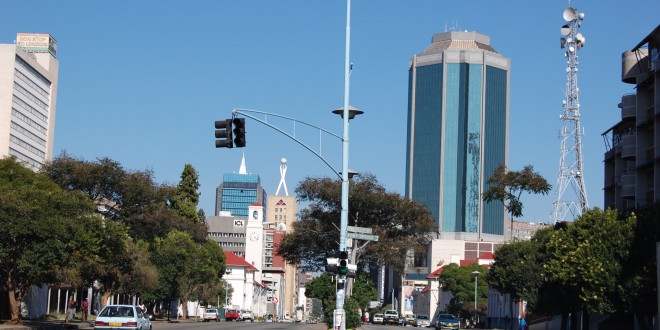- WICKNELL CHIVAYO left school at 15
- DISGRUNTLED Zimbabwe police stage uniform protest.
- MNANGAGWA wife Auxillia drops charges against nine women who boed her in Manicaland
- O.J. Simpson dies of cancer , aged 76.
- South Africa ANC is the cause of ZIMBABWE troubles claims Zimbabwe opposition politician Job Sikhala
Reserve Bank of Zimbabwe (RBZ) to release $5 bond note denomination into circulation by March 2017

,
THE much awaited $5 bond note denomination is set to be released into circulation by March this year, with indications the number of Point of Sale (POS) machines has soared to 30 000 from 9 000 in the past few months, as the Reserve Bank of Zimbabwe (RBZ) continues to ramp-up efforts to ease cash shortages.
The country last week noted a reduction in bank queues following the introduction of bond notes although there is still massive pressure by members of the public on banks to disburse higher cash denominations. In a wide ranging interview last week, RBZ Governor Dr John Mangudya took a swipe at the culture of spending long hours in queues for cash, saying the public should embrace the usage of plastic money.
The $1 bond coins and $2 bond notes were introduced in November last year as an export incentive and to ease cash shortages triggered by flight of the US dollar. US$72,9 million of bond notes are now on the market after the RBZ paid the export incentive to exporters of goods and services, including diaspora remittances.
Dr Mangudya told our Harare Bureau that the $5 notes will be released in March in a gradual manner with monetary authorities wary of not over-flooding the market with the currency.
“The $5 notes will be unveiled when it comes at the appropriate time, normally those are issues of security, but they will be on the market during the first quarter around March. We are not going to flood the market but we want to make sure that bond notes continue to be a reliable medium of exchange.”
He encouraged employers to manage their employees so that they do not queue for cash hours on end instead of engaging in productive work.
“Employers need to manage their employees better. What time will they be working if they spend the whole day at the bank?’ he asked. If you check we normally have problems when people get paid. Instead of working they will be at the bank.”
Dr Mangudya encouraged members of the public to withdraw cash on a gradual basis, saying their money is safe within the banking system. He said panic withdrawals put unnecessary pressure on banks.
“Our banking sector is sound, there is no need to panic and put unnecessary pressure on the banks. We must give our banks some space. We are encouraging people to use plastic money and mobile banking. This is very critical because it reduces pressure on the hard cash. The purpose of money is to transact and by using your card or electronic banking system, it achieves the same purpose. As we speak we have invested a significant amount of money in improving our infrastructure. We have released more than 30 000 Point of Sale machines, which is significant from the 9 000 we had by mid last year.”
He said plastic money transactions at established retailers have gone up to between 60 to 70 percent. Dr Mangudya said the RBZ is aware of some retailers who are painting a bad picture on the country’s POS infrastructure.
“Our electronic banking infrastructure is intact but just like any other electronic gadget, sometimes the system breaks down.
lt’s not more about the card but service providers might have problems, it’s normal just like any other system. Perfection is very difficult to attain but when the system is working 90 to 95 percent, I think it will be very good. The banks are working very hard to improve, this is work in progress.”
Dr Mangudya said the RBZ is working with other Government departments to promote the usage of plastic money and mobile banking. Since early last year, Zimbabwe has been facing critical shortages of the US dollar owing to a number of factors that include high imports versus low imports, low foreign direct investment and the fact that the country was being used as a fishing pond for the greenback. source-sundaynews